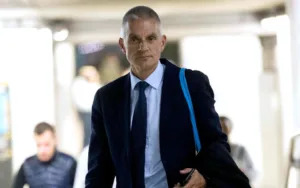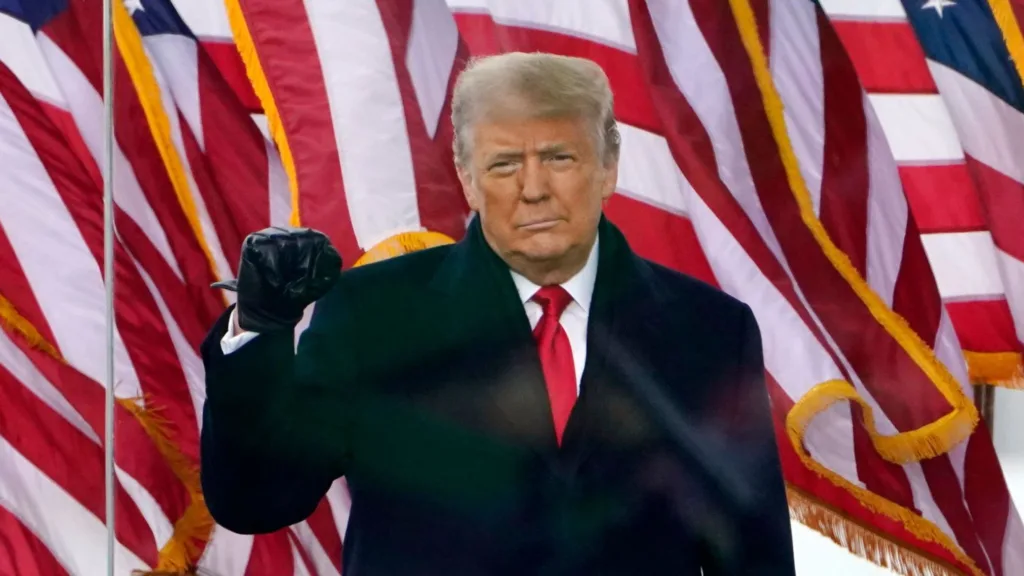LONDON/WASHINGTON U.S. President Donald Trump has accused the BBC of “purposefully dishonest” reporting after revelations emerged that a BBC Panorama documentary had edited and re-ordered parts of his 2021 speech from the day of the Capitol riots.
The controversy has triggered resignations among senior BBC executives and prompted public criticism from the White House, escalating into one of the most significant editorial scandals faced by the UK broadcaster in recent years.
White House Reacts Swiftly
The White House was quick to react after reports of the resignations broke. Press Secretary Karoline Leavitt, in an interview with The Daily Telegraph, criticised the BBC, calling the broadcaster “100% fake news.”
“This purposefully dishonest, selectively edited clip by the BBC is further evidence that they are total, 100% fake news that should no longer be worth the time on the television screens of the great people of the United Kingdom,” Leavitt told the paper.
Her comments came just hours after BBC senior executives reportedly resigned over the scandal, which stemmed from how a 2021 Trump speech was edited for a Panorama programme broadcast shortly before the 2024 U.S. election.
Trump Responds on Truth Social
Following the resignations, Mr Trump posted a lengthy statement on his social platform, Truth Social, claiming vindication.
“The TOP people in the BBC, including TIM DAVIE, the BOSS, are all quitting/FIRED, because they were caught ‘doctoring’ my very good (PERFECT!) speech of January 6th,” Trump wrote.
“Thank you to The Telegraph for exposing these corrupt ‘journalists.’ These are very dishonest people who tried to step on the scales of a Presidential Election,” he added. “On top of everything else, they are from a foreign country, one that many consider our Number One Ally. What a terrible thing for Democracy!”
How the Scandal Began
The row stems from a Panorama investigation aired by the BBC ahead of the 2024 U.S. election. According to The Telegraph, which leaked an internal memo, the programme spliced together two separate parts of Trump’s speech from 6 January 2021 — the day his supporters stormed the U.S. Capitol.
The documentary presented the following line as one continuous statement:
“We’re gonna walk down to the Capitol and I’ll be with you and we fight. We fight like hell and if you don’t fight like hell, you’re not gonna have a country anymore.”
In reality, those phrases were delivered more than an hour apart during Trump’s rally speech — and were separated by entirely different sections of commentary.
What Was Actually Said
In the full transcript, Trump’s first remarks referred to “peacefully and patriotically” marching to the Capitol to “cheer on” members of Congress. The “fight like hell” line appeared much later, near the end of his address.
By merging these two moments and overlaying them with footage of the crowd, BBC editors had effectively created a single, continuous sentence suggesting direct incitement something not supported by the unedited speech.

Editorial Fallout at the BBC
The fallout was swift. Multiple resignations were confirmed among BBC senior producers and editorial leads involved in the Panorama documentary. BBC Chairman Samir Shah is reportedly expected to apologise to MPs in the coming days, while the network has ordered an internal review of its editorial oversight procedures.
The controversy comes at a time when the broadcaster is already under scrutiny over impartiality and accuracy in political coverage.
Broader Political Implications
The BBC’s actions have given the Trump administration and its allies fresh ammunition to attack mainstream media credibility.
Conservative commentators in both the UK and the U.S. have described the edit as “an egregious breach of trust,” while media watchdogs have called for greater transparency in public broadcasting.
The BBC maintains that the editing “was not intended to mislead” but has acknowledged “serious errors in judgement” in the production process.
Background: The January 6 Context
The speech in question was delivered hours before pro-Trump rioters stormed the U.S. Capitol in an attempt to block certification of Joe Biden’s 2020 election victory.
Trump’s critics have long accused him of using inflammatory rhetoric that contributed to the violence. His defenders insist his words were rhetorical and protected under free speech.
Legal Aftermath
Trump’s alleged role in the events of January 6 led to a federal indictment on four felony counts, accusing him of conspiring to overturn the election results. However, after his 2024 re-election, federal prosecutors dismissed the case, citing Justice Department policy that sitting presidents cannot be prosecuted.
In a final report, Special Counsel Jack Smith wrote that he believed there was sufficient evidence for conviction had the case gone to trial a statement Trump and his allies strongly rejected.
Debate Over Media Accountability
Media analysts say the incident highlights ongoing tensions between journalism and politics in a polarized environment.
“It’s a cautionary tale about editorial shortcuts in politically sensitive stories,” said Dr. Helen Warren, a media ethics expert at King’s College London. “The BBC’s credibility depends on rigorous fact-checking and transparency — and this case shows how even small edits can have huge repercussions.”
Next Steps for the BBC
The BBC’s Board of Governors is expected to meet this week to discuss the fallout and potential reforms to ensure editorial integrity. The corporation has also promised to review how politically sensitive material is handled before broadcast, especially in international contexts.
While Mr Trump’s response has been characteristically fiery, analysts say the episode could further strain transatlantic relations between U.S. conservatives and British media institutions.


